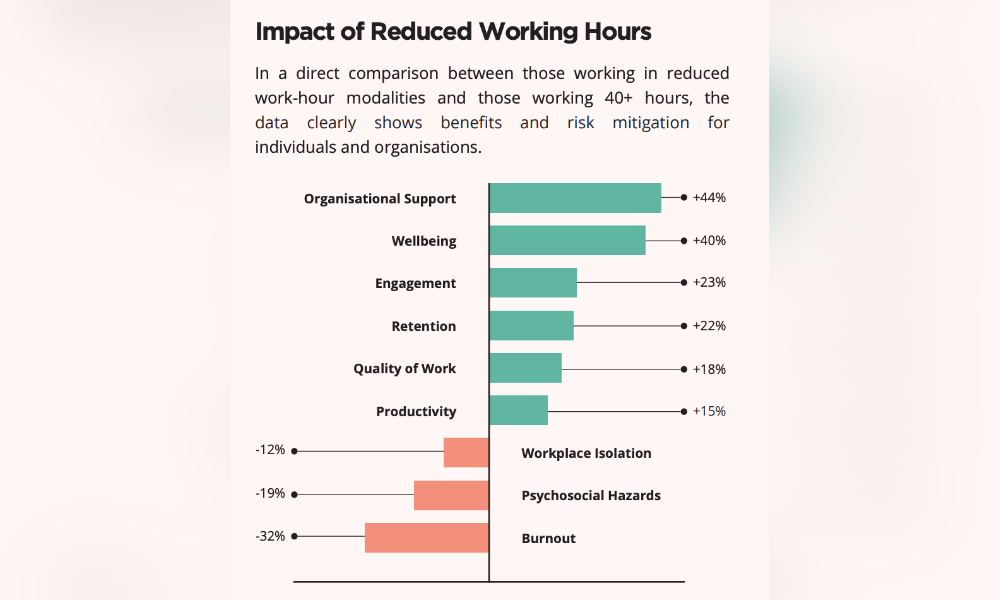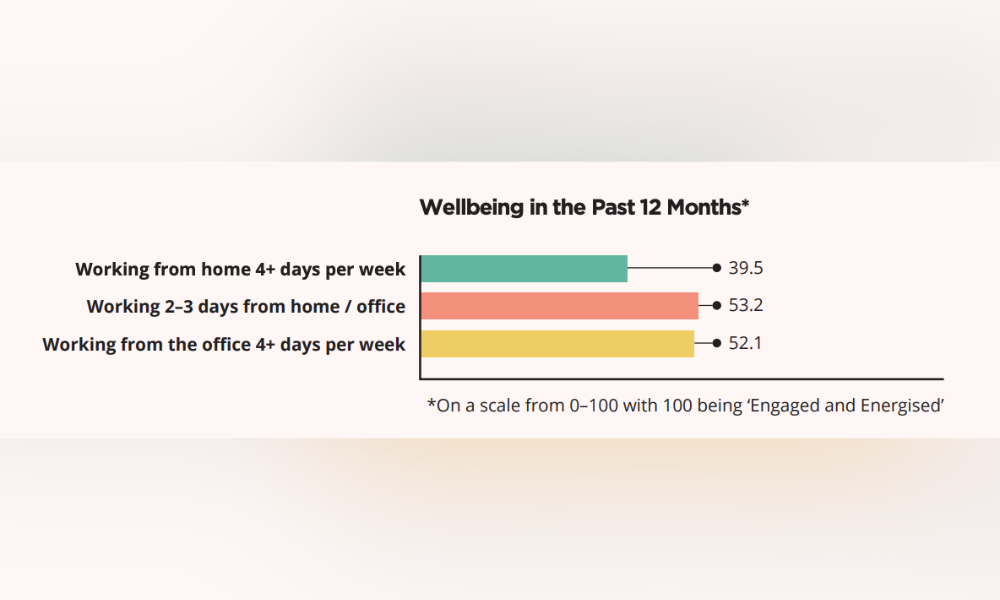
More positive outcomes for productivity, engagement, wellbeing, retention with reduced work hour modality, says expert

Alternative work arrangements are proving to be effective measures in improving wellbeing as burnout remains persistent among employees, according to a new report.
Infinite Potential's latest findings on the state of workplace burnout found that those with shorter work weeks have higher rates of engagement and overall wellbeing.
"What we found was that across the board that we were measuring – so that includes productivity, engagement, wellbeing, retention, all of those metrics – those working under reduced work hour modality had a much more positive outcome than those who did not," said Dr. John Chan, one of the researchers in the report.
"We also found that only nine per cent of those working in reduced work modes were experiencing burnout, compared to 42% of those working 40 or more hours."

Source: The State of Burnout 2024
The findings further solidify the benefits of four-day work weeks and other work arrangements offering fewer hours amid ongoing pilot runs for such work modes across the world.
Meanwhile, the report also found that employees under hybrid work arrangements report better wellbeing than other employees.
"Those working from a hybrid type of model who are in-office for two to three days a week have the highest level of wellbeing and the lowest level of burnout," Chan said.
Many employers are struggling to find a balance between in-office days and work-from-home days.
But being in the office more doesn't necessarily mean lower wellbeing for employees, according to the report. Those in the office more than four days a week, despite logging the highest burnout rate, also recorded high levels of wellbeing.

Source: The State of Burnout 2024
Chan said this still means there's still a lot of value of coming to the office.
"But it's all about what you do when you're in the office," he said. "The worst thing to do and the worst feeling is if you come to the office and there's nobody there and you're just on Teams meetings all day, like what is the point of that?"
These finding support research calling on employers to make office returns "commute worthy," with Chan saying employees prefer organisations who have transformed in-office days to collaborative ones.
"What they really like are organisations who have transformed the days when they're in the office into: 'OK, we're all together, let's work on things that build on more collaborative type of work and then for the days at home you can do the all the focus work,'" he said. "That's what makes the biggest difference."
These findings come as burnout remains prevalent across workplaces. The report found that burnout rates are at 38% for employees, with burnout increasing for women and decreasing for men.
This persistence is likely because of disconnected perceptions of wellbeing between managers and employees. Around two in three of managers (68%) believe their people's wellbeing is the same or better compared to 12 months ago, but 45% of the respondents said their wellbeing is actually worse.
Chan attributed this to two potential reasons: "First thing is we know managers and people leaders are probably more likely to be burned out than those individual contributors. So, if you yourself are burned out, you're not going to have time to recognise these things from other people."
The second likely explanation is that managers would need additional training to recognise and understand their employees.
"If you want your managers to look after your people, you need to make sure that they have the time to do it and also that they have proper training to understand what they should be doing," Chan said.
To improve wellbeing at work, Chan said employers should be open to experimenting.
"Ask your people what works best for them, and I would say that probably the most important thing is to be open to experimenting for each team to try something different that will work for them," he said.
Communicating is also crucial in improving wellbeing, he added.
"We can't address the problem until we are all on the same page about what's the problem and what are the causes of the problem," Chan said. "So, finding different ways to talk about it is really important until everyone in the organisation understands the same definition about the problem and how we're going to address it."